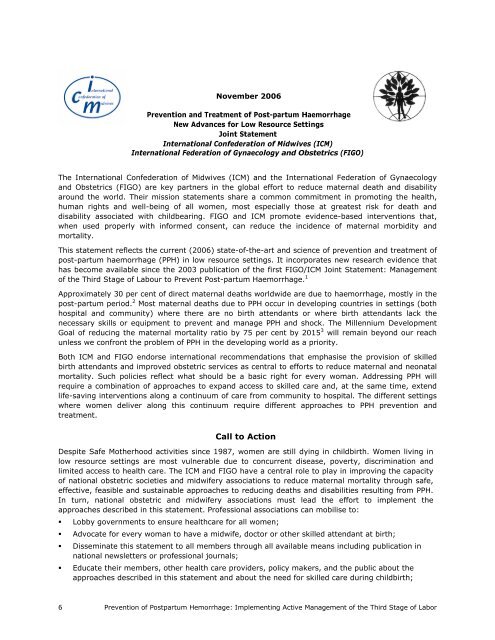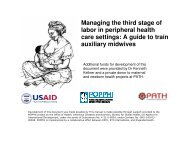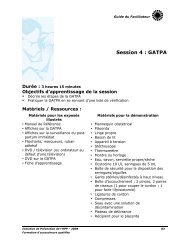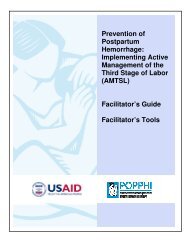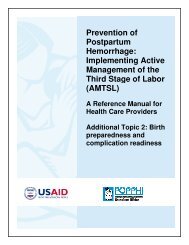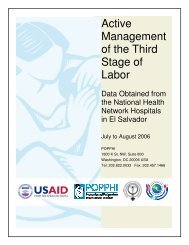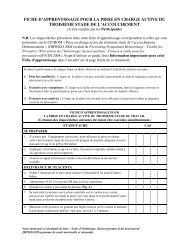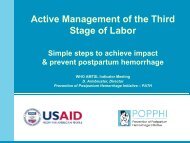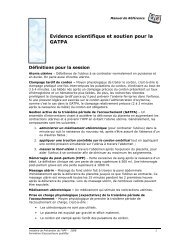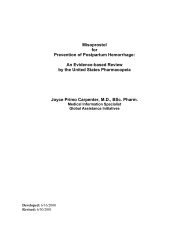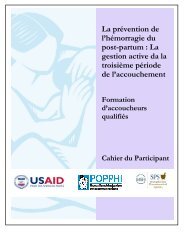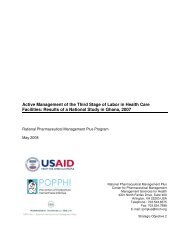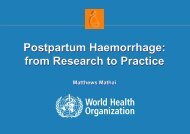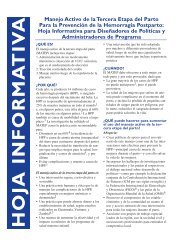Implementing Active Management of the Third Stage of Labor
Implementing Active Management of the Third Stage of Labor
Implementing Active Management of the Third Stage of Labor
You also want an ePaper? Increase the reach of your titles
YUMPU automatically turns print PDFs into web optimized ePapers that Google loves.
November 2006<br />
Prevention and Treatment <strong>of</strong> Post-partum Haemorrhage<br />
New Advances for Low Resource Settings<br />
Joint Statement<br />
International Confederation <strong>of</strong> Midwives (ICM)<br />
International Federation <strong>of</strong> Gynaecology and Obstetrics (FIGO)<br />
The International Confederation <strong>of</strong> Midwives (ICM) and <strong>the</strong> International Federation <strong>of</strong> Gynaecology<br />
and Obstetrics (FIGO) are key partners in <strong>the</strong> global effort to reduce maternal death and disability<br />
around <strong>the</strong> world. Their mission statements share a common commitment in promoting <strong>the</strong> health,<br />
human rights and well-being <strong>of</strong> all women, most especially those at greatest risk for death and<br />
disability associated with childbearing. FIGO and ICM promote evidence-based interventions that,<br />
when used properly with informed consent, can reduce <strong>the</strong> incidence <strong>of</strong> maternal morbidity and<br />
mortality.<br />
This statement reflects <strong>the</strong> current (2006) state-<strong>of</strong>-<strong>the</strong>-art and science <strong>of</strong> prevention and treatment <strong>of</strong><br />
post-partum haemorrhage (PPH) in low resource settings. It incorporates new research evidence that<br />
has become available since <strong>the</strong> 2003 publication <strong>of</strong> <strong>the</strong> first FIGO/ICM Joint Statement: <strong>Management</strong><br />
<strong>of</strong> <strong>the</strong> <strong>Third</strong> <strong>Stage</strong> <strong>of</strong> Labour to Prevent Post-partum Haemorrhage. 1<br />
Approximately 30 per cent <strong>of</strong> direct maternal deaths worldwide are due to haemorrhage, mostly in <strong>the</strong><br />
post-partum period. 2 Most maternal deaths due to PPH occur in developing countries in settings (both<br />
hospital and community) where <strong>the</strong>re are no birth attendants or where birth attendants lack <strong>the</strong><br />
necessary skills or equipment to prevent and manage PPH and shock. The Millennium Development<br />
Goal <strong>of</strong> reducing <strong>the</strong> maternal mortality ratio by 75 per cent by 2015 3 will remain beyond our reach<br />
unless we confront <strong>the</strong> problem <strong>of</strong> PPH in <strong>the</strong> developing world as a priority.<br />
Both ICM and FIGO endorse international recommendations that emphasise <strong>the</strong> provision <strong>of</strong> skilled<br />
birth attendants and improved obstetric services as central to efforts to reduce maternal and neonatal<br />
mortality. Such policies reflect what should be a basic right for every woman. Addressing PPH will<br />
require a combination <strong>of</strong> approaches to expand access to skilled care and, at <strong>the</strong> same time, extend<br />
life-saving interventions along a continuum <strong>of</strong> care from community to hospital. The different settings<br />
where women deliver along this continuum require different approaches to PPH prevention and<br />
treatment.<br />
Call to Action<br />
Despite Safe Mo<strong>the</strong>rhood activities since 1987, women are still dying in childbirth. Women living in<br />
low resource settings are most vulnerable due to concurrent disease, poverty, discrimination and<br />
limited access to health care. The ICM and FIGO have a central role to play in improving <strong>the</strong> capacity<br />
<strong>of</strong> national obstetric societies and midwifery associations to reduce maternal mortality through safe,<br />
effective, feasible and sustainable approaches to reducing deaths and disabilities resulting from PPH.<br />
In turn, national obstetric and midwifery associations must lead <strong>the</strong> effort to implement <strong>the</strong><br />
approaches described in this statement. Pr<strong>of</strong>essional associations can mobilise to:<br />
<br />
<br />
<br />
<br />
Lobby governments to ensure healthcare for all women;<br />
Advocate for every woman to have a midwife, doctor or o<strong>the</strong>r skilled attendant at birth;<br />
Disseminate this statement to all members through all available means including publication in<br />
national newsletters or pr<strong>of</strong>essional journals;<br />
Educate <strong>the</strong>ir members, o<strong>the</strong>r health care providers, policy makers, and <strong>the</strong> public about <strong>the</strong><br />
approaches described in this statement and about <strong>the</strong> need for skilled care during childbirth;<br />
6 Prevention <strong>of</strong> Postpartum Hemorrhage: <strong>Implementing</strong> <strong>Active</strong> <strong>Management</strong> <strong>of</strong> <strong>the</strong> <strong>Third</strong> <strong>Stage</strong> <strong>of</strong> <strong>Labor</strong>


